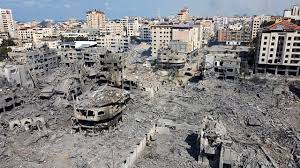ISRAELI forces pounded the suburbs of Gaza City overnight from the air and ground, destroying homes and driving more families out of the area, as Prime Minister Benjamin Netanyahu’s security cabinet meets on Sunday, August 31, to discuss a plan to seize the city.
Local health authorities said Israeli gunfire and strikes killed at least 30 people on Sunday, including 13 who tried to get food from near an aid site in the central Gaza Strip, and at least two in a house in Gaza City.
The Israeli military spokesperson’s office said they were reviewing the reports, adding that when it comes to the report of an airstrike that killed two people, it did not have sufficient details to check the report, but that it takes steps to reduce harm to civilians when fighting militants.
Gaza health authorities also said at least 15 people, including five children, were killed in an attack on a residential building in the heart of Gaza City on Saturday.
Residents of Sheikh Radwan, one of the largest neighbourhoods of Gaza City, said the territory had been under Israeli tank shelling and airstrikes throughout Saturday and on Sunday, forcing families to seek shelter in the western parts of the city.
The Israeli military has gradually escalated its operations around Gaza City over the past three weeks, and on Friday, it ended temporary pauses in the area that had allowed for aid deliveries, designating it a “dangerous combat zone.”
“They are crawling into the heart of the city where hundreds of thousands are sheltering, from the east, north and south, while bombing those areas from the air and ground to scare people to leave,” said Rezik Salah, a father of two, from Sheikh Radwan.
An Israeli official said Netanyahu’s security cabinet will discuss the next stages of the planned offensive to seize Gaza City, which he has described as Hamas’ last bastion.
A full-scale offensive is not expected to start for weeks. Israel says it wants to evacuate the civilian population before moving more ground forces in.
Netanyahu confirmed on Sunday that Israeli forces had targeted Abu Ubaida, spokesperson of Hamas’ armed wing.
Defence Minister, Israel Katz, said on social media platform X, that Abu Ubaida was killed.
Ubaida, also known as Hozayfa Al-Khalout, is a well-known figure to Palestinians and Israelis alike, close to Hamas’ top military leaders and in charge of delivering the group’s messages, often via video, for around two decades.
He became one of the most known figures of the Hamas armed wing, al-Qassam Brigades, delivering prerecorded statements while wearing a red keffiyeh that concealed his face.
In his last statement on Friday, August 29, he warned that a planned Israeli offensive on Gaza City would endanger the hostages.
The US targeted him with sanctions in April 2024, accusing him of leading the “cyber influence department” of al-Qassam Brigades.
Two Hamas officials contacted by Reuters on Sunday did not immediately comment.
On Saturday, Red Cross head, Mirjana Spoljaric, said an evacuation from the city would provoke a massive population displacement that no other area in the Gaza Strip is equipped to absorb, amid severe shortages of food, shelter and medical supplies.
Around half of the enclave’s more than two million people are presently in Gaza City. Several thousand were estimated to have left the city for central and southern areas of the enclave, according to local sources.
Israel’s military has warned its political leaders that the offensive is endangering hostages still being held by Hamas in Gaza. Protests in Israel calling for an end to the war and the release of the hostages have intensified in the past few weeks.
Large crowds demonstrated in Tel Aviv on Saturday evening, and hostages’ families protested outside the homes of ministers on Sunday morning.
The war began with a Hamas-led attack on southern Israel on October 7, 2023, in which around 1,200 people were killed, mostly civilians, and 251 taken hostage.
Twenty of the remaining 48 hostages are believed to still be alive.
Israel’s military campaign in Gaza has killed over 63,000 people, mostly civilians, according to Gaza health officials, and it has plunged the enclave into a humanitarian crisis and left much of it in ruins.
Israel is considering annexation in the occupied West Bank as a possible response to France and other countries recognising a Palestinian state, according to three Israeli officials, and the idea will be discussed further on Sunday, another official said.
Extension of Israeli sovereignty to the West Bank – de facto annexation of land captured in the 1967 Middle East war – was on the agenda for Netanyahu’s security cabinet meeting late on Sunday that is expected to focus on the Gaza war, a member of the small circle of ministers said.
It is unclear where precisely any such measure would be applied and when, whether only in Israeli settlements or some of them, or in specific areas of the West Bank like the Jordan Valley and whether any concrete steps, which would likely entail a lengthy legislative process, would follow discussions.
Any step toward annexation in the West Bank would likely draw widespread condemnation from the Palestinians, who seek the territory for a future state, as well as Arab and Western countries. It is unclear where US President, Donald Trump, stands on the matter.

Published:


